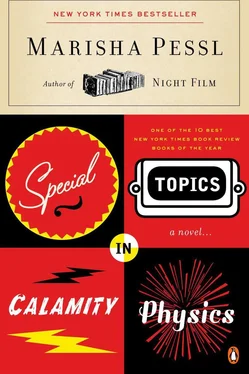He sat there, his face burnt-tan and brutal in the gold lamplight, supremely arrogant and unapologetic (see “Picasso enjoying the fine weather in the South of France,” Respecting the Devil , Hearst, 1984, p. 210). He was waiting for me to retire, retreat, as if I were one of his limp-jawed students who’d shown up during Office Hours, interrupting his research to pose some crackpot question about right and wrong.
I wanted to kill him. I wanted to take a fire poker to his too, too solid flesh (anything hard and pointy would have done) so his hard-bitten face would deform in fear and out of his mouth, not that perfect piano sonata of words, but a strangled, soul-ripped Ahhhhhhhhh! the kind of sob one hears reverberating through damp chronicles of medieval torture and the Old Testament. Hot tears had begun their exodus, making their slow, stupid way down my face.
“I–I’m not leaving,” I said again. “ You go. Go back to the Congo.”
He gave no indication he’d even heard me, because his cherished lecture on the ABCs of Reaganism had already snagged his attention. His head was down, glasses returned to the end of his nose, an implacable smile. I tried to think of something to say, something huge and thrilling — a hypothesis of some kind, an obscure quotation that would knock him off his seat, turn his eyes to quarters. But as so often happens when one is thinking and feeling in the commotion of the present moment, I couldn’t think of a thing. All I could do was stand with my arms at my sides, arms that felt like chicken wings.
The next few moments transpired in a detached haze. I felt the same sensation convicted murderers saturated in inmate orange describe in detail when asked by a keen news reporter wearing crummy bronze makeup how he/she, so seemingly average a human being, came to brutally wring the life out of a certain harmless person. Such offenders speak, a little dizzily, of the lonely clarity that settled over them on that fateful day, light as a swooping cotton sheet, an awake anesthesia that permitted them for the first time in their quiet lives to ignore Prudence and Discretion, to give Good Sense the cold shoulder, to snub Self-Preservation and look right through Second Thoughts.
I walked out of the library, down the hall. I stepped outside, closing the front door behind me as softly as I could, so the Prince of Darkness didn’t hear. I stood for two or three minutes on the steps, staring at the barebones trees, the strict light from the windows quilting the lawn.
I began to run. It was awkward at first in Jefferson’s high heels, so I took them off, flung them over my shoulder. I hurried down the driveway and then down the street, past the empty cars and the flower beds cruddy with pinecones and dead flower stalks, past the potholes and mailboxes and the fallen branches grasping the street and the greenish puddles of light leaking from the streetlights.
Our house, 24 Armor Street, was buried in a densely forested section of Stockton known as Maple Grove. Though it wasn’t one of those Orwellian gated communities like Pearl Estates (where we lived in Flitch) with identical white houses lined up like post-orthodontics teeth and the entry gate an aging actress (shrill, rusty, temperamental), Maple Grove still boasted its own exclusive Town Hall, Police Force, Zip Code and its own Unfriendly Welcome Sign (“You are now entering the Township of Maple Grove, an elegant and private residential community”).
The fastest way out of the Grove was to cut directly south off our street, head into the woods and skulk through some twenty-two elegant and private backyards. I carefully made my way, hiccupping and crying at the same time, the houses noiseless and sedate, slumped against the smooth lawns like dozing elephants on ice rinks. I crawled through a barricade of blue spruce, scrambled through a reef of pines, shimmied down a hill, until I was unceremoniously emptied out, like water from a gutter, onto Orlando Avenue, Stockton’s answer to the Sunset Strip.
I was without plan, plum out of ideas, at a loss. Even within fifteen minutes of running away from home, unmooring oneself from one’s parent, one was struck by the vastness of things, the typhoon ferocity of the world, the frailty of one’s boat. Without thinking, I hurried across the street to the BP gas station and pushed open the door to the Food Mart. It dinged a pleasant hello. The kid always working, Larson, was incarcerated in the front in his bulletproof holding pen, talking to one of his girlfriends dangling in front of his window like an air freshener. I ducked into the nearest aisle.
Well, it just so happened Hello, My Name Is LARSON was a kid Dad took to like a Surinam Cockroach to bat droppings. He was one of those unsinkable eighteen-year-olds, with a Hardy Boy face no one had anymore, all freckles and gee-whiz grin, thick brown hair that grew around his face like an urn plant and a lanky body in constant motion as if he were being operated by a ventriloquist on speed (see Chapter 2, “Charlie McCarthy,” The Puppets That Changed Our Lives , Mesh, 1958). Dad found Larson wondrous . And that was the thing with Dad: he’d teach Modes of Mediation to a thousand John Dorys he was barely able to stomach, and then he’d pay a kid for berry-flavored Tums and fall head over heels, declaring him a veritable dolphin who’d spiral through the air when you whistled. “Now that’s a promising young man,” said Dad. “I’d exchange every Happy, Sleepy and Doc to teach him. He has spark. You don’t find that often.”
“If it ain’t the girl with the dad,” announced the store intercom. “Innit past yer bedtime?”
Doused in the dead light of the Food Mart, I felt absurd. My feet hurt, I was wearing an overcooked marshmallow and my face (I could see it plainly in the reflective shelving) was decaying by the minute into an unstable mess of crusty tears and bad makeup (see “Radon-221,” Questions of Radioactivity , Johnson, 1981, p. 120). I was also festooned with one billion pine needles.
“Come on over here and say hello! Whatcha doin’ out so late?”
Reluctantly, I made my way to the cashier window. Larson was wearing jeans and a red T-shirt that read MEAN REDS, and he was grinning. And that was the thing with Larson; he was one of those people who grinned all the time. He had ticklish eyes too, which had to explain the multitude of nutty-eyed peanut-butter parfaits thawing all over his Food Mart on any given night. Even when you were standing in front of his window innocuously paying for gas, his eyes, the clear-cut color of milk chocolate or mud, had a way of oozing all over you, so you couldn’t help but have a feeling he was seeing something private about you — you stark naked, for example, or you saying humiliating things in your sleep, or worst of all, you in your favorite dumb fantasy, in which you walked a red carpet and wore a long beaded gown everyone took great pains not to step on.
“Lemme guess,” he said. “Boyfriend trouble.”
“Oh. I, uh, had a fight with my dad.” I sounded like scrunched aluminum foil.
“Yeah? Saw him the other day. Came by with his girlfriend.”
“They broke up.”
He nodded. “Hey, Diamanta, go get her a Slurpee.”
“Whut,” said Diamanta, making a sour face.
“Seventy-ounce. Any flavor. On me.”
Diamanta, in glittery pink shirt and sparkly jean miniskirt, was Pixy-stick skinny and had that wan, white parchment skin through which, in harsher lights, you could glimpse thin blue veins swimming through her arms and legs. Scowling at me, she removed her black platform boot from the bottom of the greeting card stand, turned and twinkled down the aisle.
“Sure,” Larson said, shaking his head. “Old mans. They can be tough. When I was fourteen my pops cleared out. Left me nothin’ but work boots and his subscription to People magazine, I kid you not. Two years? Did nothin’ but glance over my shoulder, look for him every place. Think I’d see him ’cross the street. Passin’ by on a bus. An I’d tail the bus one enda town to the other, thinkin’ it was him , waitin’, waitin’ like a crazy man, just for him to get out at the stop. Only when he got out, it was someone else’s old man. Wudn’t mine. Things turned out, though, what he did? Best thing ever happened to me. Wanta know why?”
Читать дальше












